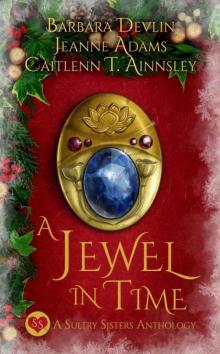 Pirates of Britannia Boxed Set Volume One: A Collection of Pirate Romance Tales
Pirates of Britannia Boxed Set Volume One: A Collection of Pirate Romance Tales A Very Brethren Christmas (Brethren of the Coast Book 10)
A Very Brethren Christmas (Brethren of the Coast Book 10) Brethren of the Coast Box Set 2
Brethren of the Coast Box Set 2 Hold Me, Thrill Me, Kiss Me: A Brethren of the Coast Novella
Hold Me, Thrill Me, Kiss Me: A Brethren of the Coast Novella The Reaper (Pirates of the Coast Book 8)
The Reaper (Pirates of the Coast Book 8) The Stablemaster's Daughter (Regency Rendezvous Book 11)
The Stablemaster's Daughter (Regency Rendezvous Book 11) World of De Wolfe Pack_The Big Bad De Wolfe
World of De Wolfe Pack_The Big Bad De Wolfe The Duke Wears Nada
The Duke Wears Nada The Iron Corsair (Pirates of the Coast Book 2)
The Iron Corsair (Pirates of the Coast Book 2) The Buccaneer
The Buccaneer Hold Me, Thrill Me, Kiss Me
Hold Me, Thrill Me, Kiss Me The Reaper
The Reaper The Blood Reaver
The Blood Reaver Morgan (Brethren Origins Book 4)
Morgan (Brethren Origins Book 4) Love With an Improper Stranger
Love With an Improper Stranger The Blood Reaver (Pirates of Britannia Book 6)
The Blood Reaver (Pirates of Britannia Book 6) Tall, Dark & De Wolfe
Tall, Dark & De Wolfe World of de Wolfe Pack: Lone Wolfe (Kindle Worlds Novella) (Heirs of Titus De Wolfe Book 1)
World of de Wolfe Pack: Lone Wolfe (Kindle Worlds Novella) (Heirs of Titus De Wolfe Book 1) The Black Morass (Pirates of the Coast Book 1)
The Black Morass (Pirates of the Coast Book 1) A Jewel In Time; A Sultry Sisters Anthology
A Jewel In Time; A Sultry Sisters Anthology The Marooner
The Marooner The Iron Corsair
The Iron Corsair The Most Unlikely Lady
The Most Unlikely Lady One-Knight Stand
One-Knight Stand Arucard (Brethren Origins Book 1)
Arucard (Brethren Origins Book 1) Once Upon a Christmas Knight
Once Upon a Christmas Knight Demetrius (Brethren Origins Book 2)
Demetrius (Brethren Origins Book 2) The Buccaneer (Pirates of the Coast)
The Buccaneer (Pirates of the Coast) The Marooner (Pirates of the Coast Book 3)
The Marooner (Pirates of the Coast Book 3) World of De Wolfe Pack: The Big Bad De Wolfe (Kindle Worlds Novella) (Heirs of Titus De Wolfe Book 2)
World of De Wolfe Pack: The Big Bad De Wolfe (Kindle Worlds Novella) (Heirs of Titus De Wolfe Book 2) Tall, Dark, and Medieval
Tall, Dark, and Medieval My Lady, The Spy
My Lady, The Spy The Lucky One (Brethren Of The Coast #6)
The Lucky One (Brethren Of The Coast #6) Captain Of Her Heart
Captain Of Her Heart World of De Wolfe Pack_Tall, Dark & De Wolfe
World of De Wolfe Pack_Tall, Dark & De Wolfe World of De Wolfe Pack: Tall, Dark & De Wolfe (Kindle Worlds Novella) (Heirs of Titus De Wolfe Book 3)
World of De Wolfe Pack: Tall, Dark & De Wolfe (Kindle Worlds Novella) (Heirs of Titus De Wolfe Book 3) To Catch A Fallen Spy (Brethren of the Coast Book 8)
To Catch A Fallen Spy (Brethren of the Coast Book 8) Lone Wolfe
Lone Wolfe Pirates of Britannia Boxed Set Volume One: A Collection of Pirate Romance Tales
Pirates of Britannia Boxed Set Volume One: A Collection of Pirate Romance Tales A Very Brethren Christmas (Brethren of the Coast Book 10)
A Very Brethren Christmas (Brethren of the Coast Book 10) Brethren of the Coast Box Set 2
Brethren of the Coast Box Set 2 Hold Me, Thrill Me, Kiss Me: A Brethren of the Coast Novella
Hold Me, Thrill Me, Kiss Me: A Brethren of the Coast Novella The Reaper (Pirates of the Coast Book 8)
The Reaper (Pirates of the Coast Book 8) The Stablemaster's Daughter (Regency Rendezvous Book 11)
The Stablemaster's Daughter (Regency Rendezvous Book 11) World of De Wolfe Pack_The Big Bad De Wolfe
World of De Wolfe Pack_The Big Bad De Wolfe The Duke Wears Nada
The Duke Wears Nada The Iron Corsair (Pirates of the Coast Book 2)
The Iron Corsair (Pirates of the Coast Book 2) The Buccaneer
The Buccaneer Hold Me, Thrill Me, Kiss Me
Hold Me, Thrill Me, Kiss Me The Reaper
The Reaper The Blood Reaver
The Blood Reaver Morgan (Brethren Origins Book 4)
Morgan (Brethren Origins Book 4) Love With an Improper Stranger
Love With an Improper Stranger The Blood Reaver (Pirates of Britannia Book 6)
The Blood Reaver (Pirates of Britannia Book 6) Tall, Dark & De Wolfe
Tall, Dark & De Wolfe World of de Wolfe Pack: Lone Wolfe (Kindle Worlds Novella) (Heirs of Titus De Wolfe Book 1)
World of de Wolfe Pack: Lone Wolfe (Kindle Worlds Novella) (Heirs of Titus De Wolfe Book 1) The Black Morass (Pirates of the Coast Book 1)
The Black Morass (Pirates of the Coast Book 1) A Jewel In Time; A Sultry Sisters Anthology
A Jewel In Time; A Sultry Sisters Anthology The Marooner
The Marooner The Iron Corsair
The Iron Corsair The Most Unlikely Lady
The Most Unlikely Lady One-Knight Stand
One-Knight Stand Arucard (Brethren Origins Book 1)
Arucard (Brethren Origins Book 1) Once Upon a Christmas Knight
Once Upon a Christmas Knight Demetrius (Brethren Origins Book 2)
Demetrius (Brethren Origins Book 2) The Buccaneer (Pirates of the Coast)
The Buccaneer (Pirates of the Coast) The Marooner (Pirates of the Coast Book 3)
The Marooner (Pirates of the Coast Book 3) World of De Wolfe Pack: The Big Bad De Wolfe (Kindle Worlds Novella) (Heirs of Titus De Wolfe Book 2)
World of De Wolfe Pack: The Big Bad De Wolfe (Kindle Worlds Novella) (Heirs of Titus De Wolfe Book 2) Tall, Dark, and Medieval
Tall, Dark, and Medieval My Lady, The Spy
My Lady, The Spy The Lucky One (Brethren Of The Coast #6)
The Lucky One (Brethren Of The Coast #6) Captain Of Her Heart
Captain Of Her Heart World of De Wolfe Pack_Tall, Dark & De Wolfe
World of De Wolfe Pack_Tall, Dark & De Wolfe World of De Wolfe Pack: Tall, Dark & De Wolfe (Kindle Worlds Novella) (Heirs of Titus De Wolfe Book 3)
World of De Wolfe Pack: Tall, Dark & De Wolfe (Kindle Worlds Novella) (Heirs of Titus De Wolfe Book 3) To Catch A Fallen Spy (Brethren of the Coast Book 8)
To Catch A Fallen Spy (Brethren of the Coast Book 8) Lone Wolfe
Lone Wolfe